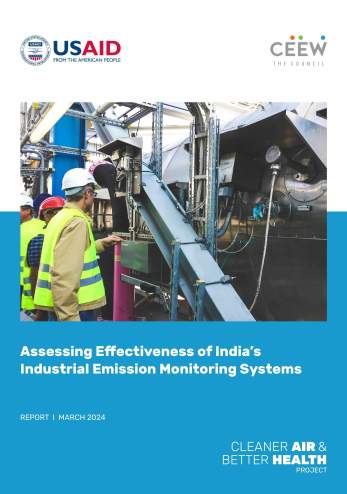



Suggested Citation: Prabhakar, Prerna, Latika, Adlakha, and Hemant Mallya. 2024. Strengthening India’s Non-tariff Measures’ Compliance: A Comparative Analysis of Key Governance Frameworks. New Delhi: Council on Energy, Environment and Water.
This policy brief provides an overview of the existing practices in regulatory compliance in international trade and suggests key elements of a potential compliance framework like information sharing; feedback and redressal; and firm-level compliance framework. A comparative assessment between the US, EU and India for these key elements, brings out the gaps in Indian governance towards NTMs compliance, and this brief provides policy suggestions to address these gaps. Some of these include providing digital updates for recent NTMs regulations and corresponding impacted sectors ; establishing formal interaction mechanisms between industry and government; specific support for MSMEs towards NTMs compliance ; and developing firm level NTM compliance frameworks.
New-age international trade is increasingly moving towards an inward-looking and protectionist trade policy approach, manifested in the form of laws, regulations, standards, and guidelines, particularly focusing on energy efficiency and sustainability. These regulations, termed non-tariff measures (NTMs), are designed in the respective domestic economies, but they equally impact their imports. Over time, trade negotiations and policies, once predominantly centred on tariff considerations, have evolved to prioritise NTMs, with an emphasis on sustainability. Although the NTMs are formulated by the receiving economy to ensure a better quality of imports in the longer run, they also might have serious short-term cost implications if the exporter does not have adequate institutional support for ensuring effective compliance with international regulations or standards.
New-age international trade is increasingly moving towards an inward-looking and protectionist trade policy approach, manifested in the form of laws, regulations, standards, and guidelines, particularly focusing on energy efficiency and sustainability. These regulations, termed non-tariff measures (NTMs), are designed in the respective domestic economies, but they equally impact their imports. Over time, trade negotiations and policies, once predominantly centred on tariff considerations, have evolved to prioritise NTMs, with an emphasis on sustainability. Although the NTMs are formulated by the receiving economy to ensure a better quality of imports in the longer run, they also might have serious short-term cost implications if the exporter does not have adequate institutional support for ensuring effective compliance with international regulations or standards. For instance, Indian exports worth USD 37 billion are at risk due to sustainability-driven NTMs of the European Union (EU). To safeguard its exports from the risk of non-compliance with NTMs and to reach its USD 1 trillion target for merchandise exports by 2030, India needs a structured framework for ensuring compliance with the EU NTM regulations, and this policy brief provides an overview of the existing practices in regulatory compliance in international trade and suggests key elements of a potential compliance framework.
While the Technical Barriers to Trade (TBT) and Sanitary and Phyto-Sanitary (SPS) agreements of the World Trade Organization (WTO) provide a global framework to ensure a level-playing field for domestic producers and importers, a uniform country-specific governance structure has not been designed as yet for facilitating NTM compliance by the domestic industry. Countries across the world have distinct frameworks in place to ensure the compliance of their domestic industry firms with foreign regulations. While countries such as the United States and EU have defined a clear division of roles and responsibilities among different departments or divisions, industry players still struggle with compliance procedures in certain cases, which eventually hampers the global competitiveness of exports. To avoid difficulties in compliance, we propose a common country-specific NTM compliance framework centred on three key principles.
The existing practices in the United States, EU, and India are compared within the framework of these three proposed principles in this issue brief to reflect on the strengths and weaknesses of each countries’ practices. An India-centric stakeholder consultation to assess the gaps in India’s existing practices and suggest suitable changes for designing an effective NTM compliance mechanism.
A comparative assessment of the governance framework clearly highlights the areas that need to be strengthened to improve Indian industry’s ability to comply with foreign regulations.
India has made considerable progress in formulating its export compliance policies, but a concerted effort to facilitate NTM compliance is needed.
The foremost requirement for effective NTM compliance is the streamlined information-sharing platform/ mechanism, which needs to be put in place in India. A process needs to be defined for understanding the regulations and providing necessary information to the nodal department, which can then be shared in a structured format with the industry. Once the capacity in the relevant departments is built, a platform needs to be conceptualised to provide real-time updates to the exporters on foreign regulations, with sector-wise details and the necessary compliance steps. In this regard, it is important to also address the sticky challenge of reported harmonised system (HS) codes and their alignment with the possibly impacted products in the compliance regulations.
Although help desks are available in the relevant department, there are no clear guidelines for exporters on how to approach them in case of any problems. Also, multiple contact points can be misleading for the exporters. To overcome this confusion, a dedicated team in the relevant government department can be assigned as the contact point for the exporters who face challenges in NTM compliance. Specific guidelines need to be put in place for the exporters to prepare and submit complaints to this team. The respective EPCs could facilitate this process.
The presence of help centres or having a dedicated NTM team in the respective embassies in other countries can be strengthened to acquire additional information or other guidance in case the exporters need it. Along with building these teams, there needs to be a formal mechanism to connect these teams with the exporters. As micro, small, and medium-sized enterprises (MSMEs) account for a considerable proportion of Indian exports, there needs to be a specific programme to help them with NTM compliance.
As the firms bear the direct cost of inadequate compliance mechanisms, it is important that they formulate dedicated in-house policies for ensuring export compliance. The standardised framework can be conceptualised by a group of experts—from the government, legal firms, and think tanks—which should be followed by all the export firms. One of the key requirements of the framework is to have a dedicated team that looks after various aspects of export compliance in the respective firms.
Non-Tariff Measures (NTMs) are policy measures other than ordinary customs tariffs that can have an economic effect on trade. Technical barriers to trade (TBT) and Sanitary and Phytosanitary (SPS) measures are the two widely used NTMs. TBT includes measures such as labelling, standards on technical specifications and quality requirements, and other measures protecting the environment. SPS measures include restrictions on substances, ensuring food safety, and those for preventing the dissemination of diseases or pests.
TBT and SPS are two widely used NTMs. Examples of TBT and SPS measures faced by India include registration, evaluation, authorisation and restriction of chemicals, eco-design requirements for power transformers, and control of wood packaging material used in the transport of specified commodities originating from India.

Financing Green Hydrogen in India

Evaluating Net-zero for the Indian Aluminium Industry

Evaluating Net-zero for the Indian Fertiliser Industry

Assessing Effectiveness of India’s Industrial Emission Monitoring Systems

Evaluating Net-zero for the Indian Cement Industry